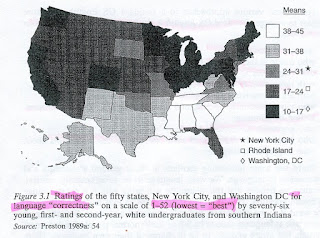 We're shifting gears this week -- from historical English to the Englishes of today, from an emphasis on written language to one on spoken language in all its variety, from the underlying structures beneath language to the overlying srtuctures society erects above and on top of language. And we could have no better guide at this moment than Rosini Lippi-Green.
We're shifting gears this week -- from historical English to the Englishes of today, from an emphasis on written language to one on spoken language in all its variety, from the underlying structures beneath language to the overlying srtuctures society erects above and on top of language. And we could have no better guide at this moment than Rosini Lippi-Green.In this chart, taken from Rosina Lippi-Green's book English With an Accent, we see how white undergrads in Indiana thought about samples of spoken language -- how "correct" or "normal" was the speech they heard. Of course, they sounded normal to themselves, and so did most folks from the Midwest, along with California, Colorado, and Washington State. The southwest, particilarly Texas, sounded less correct, and the dep south -- sometimes called the "Southern Trough" -- sounded the most incorrect of all. Rhode Islanders, incidentally, came out in the second quintile -- that is, just a little less normal than Hoosiers -- and better than New Yawk.
But what does this perception mean? If such a survey had been conducted sixty or seventy years ago, it might have come out a bit different, as most Amderican in public life -- politicians, actors, and speech-makers -- adapted the "Mid-Atlantic" accent (you can hear it, among many other places, in 1939's "The Wizard of Oz," in which everyone says Wizzahd instead of Wizerd). But this common upper-middle-to-upper-class accent faded away after WWII, and the era of broadcast television; rumbly midwesterners such as Edwin R. Murrow, Walter Cronkite, and Tom Brokaw soon set the standard, and placed out national normative right in the middle of the midwest.
But of course American accents -- mostly "L1" accents, that is, accents acquired from infancy via regional variations in one's natural/family language -- are only one part of it. For those, whether in the US or abroad, for whom English was their second (or third, or fourth) language, there's another set of issues; these we know as "L2" accents. In the same way we might call an American accent a "Southern" or a "New England" accent, L2 accents are often called "foreign," though that's not really a good way to describe them. Foreign to whom? The key difference, though, is that L2 speakers are more likely to substitute sounds from their native language in the place of less familiar (or less-familiarly-placed) sounds in English. Thus, say, a German speaker might say "heff" instead of "have," and a French speaker might pronounce "sweater" as "swettauw." We're exposed to such accents all the time, but -- as with L1 accents -- it's pop culture, in the form of cartoons, comedy skits, and television shows that often sets up our expectations. Certainly, during the time I was growing up, it was hard to avoid picking up on the negative connotations of a German accent (Colonel Klink), a Russian one (Boris Badanov), or even a French one (Pepé le Pew) -- and there were plenty of "bad" L1 accents in cartoons too (anyone remember the Hillbilly Bears?).
This week, we're going to use both the Speech Accent Archive and various Accent Tags to bend our ears to the sounds of English: here, there, and everywhere.
